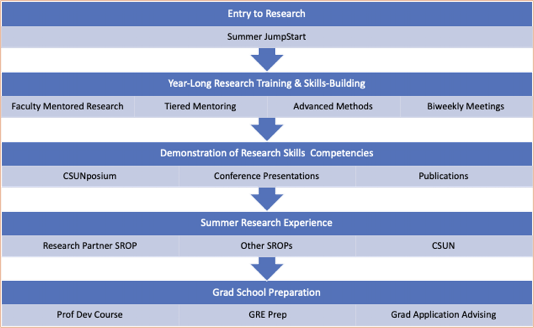BUILD PODER at California State University, Northridge, has supported and trained nearly 200 students and over 100 faculty mentors who work together on mutual biomedical research projects and present their work at professional conferences. Students originate from CSUN as well as BUILD PODER’s four community college “pipeline partners” including East Los Angeles College (ELAC), Los Angeles Valley College (LAVC), Los Angeles Pierce College (LAPC), and Pasadena City College (PCC). Students begin with a Summer JumpStart program to orient them to the ethical and technical aspects of biomedical research, take advanced research methods and professional development courses, and participate in summer research training opportunities. Mentors attend a 16-hour orientation to mentoring with humility and annual training and have opportunities for research training in pilot projects, grant-writing and other methods training, conferences that inform the community about Critical Race Theory, our theoretical and transformative foundation.
NEW to BUILD PODER are our four new cluster hired faculty members, who will be housed in our new building, Lilac Hall. Lilac Hall will also be the location of the newly forming Health Equity Research and Education (HERE) Center.
BUILD PODER has four Principal Investigators:
Lead PI: Gabriela Chavira, Department of Psychology
PI: Patty (Patchareeya Kwan), Department of Public Health
PI: Carrie Saetermoe, Department of Psychology
PI: Crist Khachikian, Department of Civil Engineering and Construction Management
BUILD PODER’s Logic Model
Our logic model, portrayed below, is framed by a historically and socially intractable problem of institutionalized racism that influences both educational and health outcomes for vulnerable or oppressed groups. Through student and faculty training, Chavira and Saetermoe provide continual and hands-on experiences that challenge the taken-for-granted assumptions we hold as a result of being socialized in a racist society. The ubiquitous nature of racism formalized by Critical Race Theory can be challenged through a strength-based awareness and reinforced through a community of rigor, belonging, and meaning through social justice linkages to biomedical research. At BUILD PODER, we emphasize that students have community cultural wealth (CCW; Yosso, 2005) that allows them to identify different research questions, methods, and interpretations that may move science forward quickly; innovation from new voices with experiences in vulnerable communities will play a significant role in reducing health disparities in research and practice in the future.

Each NIH BUILD program has four "core" responsibilities. At CSUN:
The Administrative Core provides oversight to BUILD PODER and reflects our relationships with the NIH, our Local Steering Committee, our evaluation team, CARE (Center for Assessment, Research, and Education) and our regular meetings, events, and record-keeping. The Program Director of the Administrative Core is Crist Khachikian.
The Institutional Development Core provides resources that provide sustainability (enduring into the future) and integration into California State University, Northridge's mission and priorities. Through BUILD PODER, we have a new building, Lilac Hall, four new cluster hired faculty members, and we are preparing for the opening of the Health Equity Research and Education Center after consulting with our campus and outside partners to ensure that our charter is in line with the needs of the institution as well as our foundation and skill set. In addition, through the leadership of the Institutional Development Core Program Director, Crist Khachikian, we have developed a "Faculty App" that provides a forum for faculty to publicly present their research interests, skills, and availability for collaboration with colleagues or research assistance with students.
The Research Enrichment Core provides faculty with research opportunities, skills, and mentor training to prepare them to be the best research mentors that they can be. The Research Enrichment core's research training include the Faculty Scholar Academy grant-writing training and coaching, the Pilot Project program, and regular conferences and opportunities to have one's work edited or to work collaboratively with other faculty members on grant proposals. The faculty research mentor training, a highlight of the Research Enrichment Core, is rooted in our Critical Race Theory foundations and challenges faculty members to become aware of and to respond to unconscious biases about students who are different from ourselves. The Program Director of the RE Core is Carrie Saetermoe, who gratefully welcomes the support of Patty Kwan, Department of Health Sciences, and Angie Guan, Department of Child and Adolescent Development.
The centerpiece of BUILD PODER is the Student Training Core. Program Directors Gabriela Chavira (Psychology) and Gilberto Flores (Biology) oversee the mentoring and professional development of 300+ undergraduates across 4 colleges and 30 majors. Central to the Student Training Core is the entry-to-research Summer JumpStart program, a 4-week intensive in which students learn basic research skills, research ethics, learn about the broader contexts of science and forming a science identity, and they meet with and learn more about their mentor and their new research laboratory. Each cohort is a community, and each cohort forms a mentoring bond with other cohorts. See student training overview below:

TRANSFORMATIVE PARADIGM: Critical Race Theory
BUILD PODER’s transformative framework is Critical Race Theory (CRT). Students and mentors are challenged to develop research questions, methods, interpretations, and applications relevant to their experiences and framed in familiar social justice issues.
Critical Race Theory has its roots in the Civil Rights and Critical Legal Studies movements, where it provided a framework “to critically interrogate how the law reproduces, reifies, and normalizes racism in society” (Lopez, 2003, p. 81).
NIH BUILD PODER provides linkages between biomedical research and social justice so that students and their faculty mentors can plainly see that their efforts to work on behalf of health equity will be feasible and meaningful.

